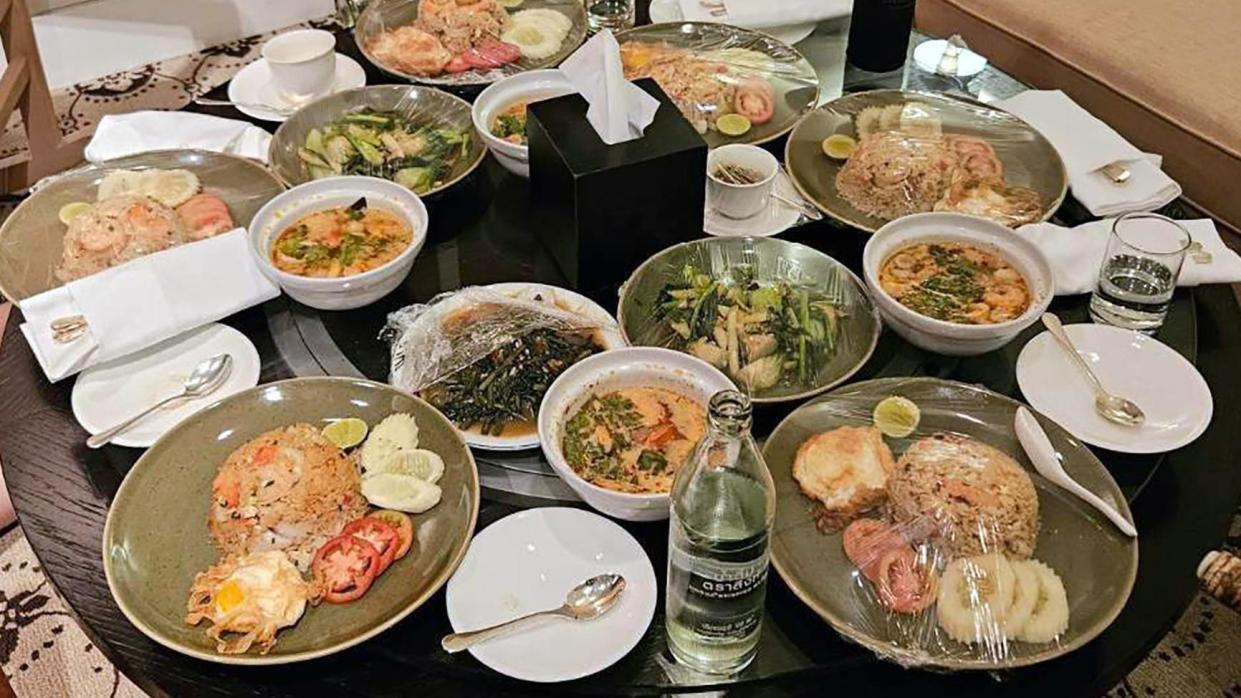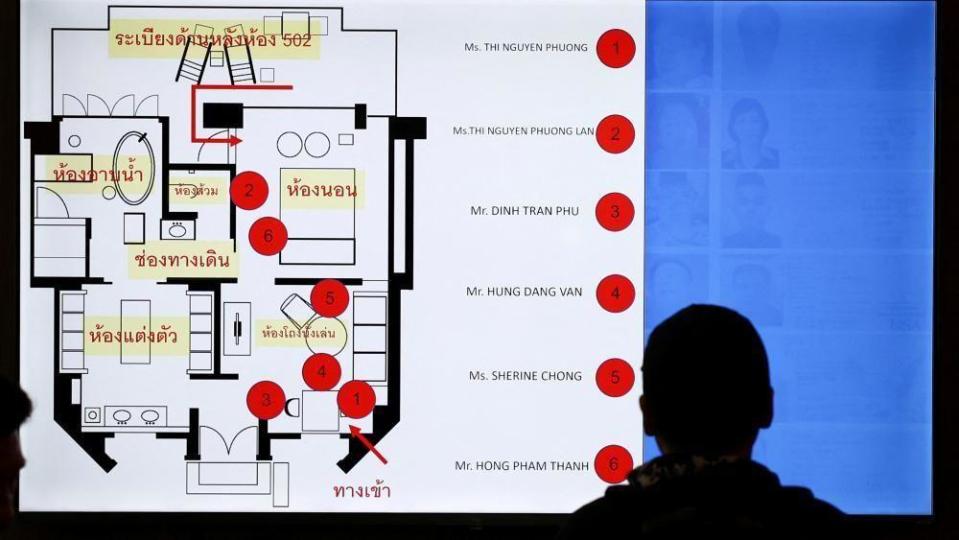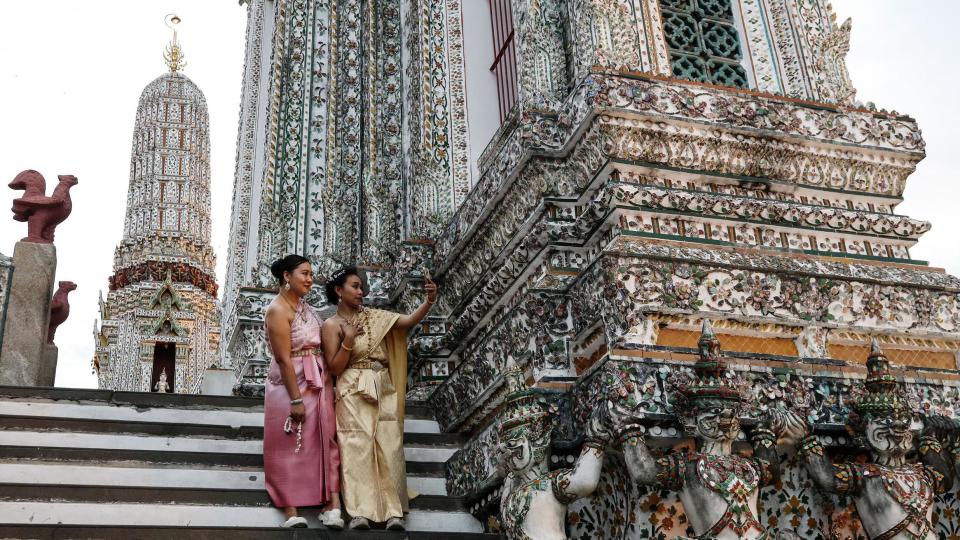Cyanide teacups in Room 502: Mystery of the Bangkok hotel deaths

There was little to indicate what had happened on the fifth floor of the Grand Hyatt Erawan in Bangkok until police officers opened the door.
No-one was heard to scream, or had rung for help. No-one had even made it to the door.
Even inside, there were apparently no signs of struggle - the untouched late lunch still laid out neatly on the table for the occupants to enjoy.
From outside of Room 502, the only clue to the horror inside the locked room was the fact the group were late checking out of the hotel.
And yet inside were six bodies, alongside tea cups laced with cyanide.
It didn't take officers long to work out the occupants of the room had drunk the poisoned tea, or to find out who the apparent victims were.
But days after police revealed the grim discovery, big questions remain: why them - and who did it?
Who are the six people who died?
Four of the victims are Vietnamese nationals - Thi Nguyen Phuong, 46, her husband Hong Pham Thanh, 49, Thi Nguyen Phuong Lan, 47, and Dinh Tran Phu, 37.
The other two are American citizens of Vietnamese origin - Sherine Chong, 56, and Dang Hung Van, 55.
According to investigators, Chong was believed to have borrowed 10 million baht ($280,000; £215,000) from husband and wife Hong Pham Thanh and Thi Nguyen Phuong to invest in a hospital building project in Japan. The couple, who owned a construction business, had apparently tried in vain to get their money back.
In fact, the matter was due to go to court in Japan in a matter of weeks.
On the face of it, this meeting appeared to be an attempt to discuss the issue in advance of the case.
Thi Nguyen Phuong Lan was there because Chong - who US media have said lived in Oakland, California - had asked her to act as her intermediary with the couple regarding the investment.
But how were the other two linked to the case?
Dinh Tran Phu - a successful make-up artist whose clientele includes movie stars, singers and beauty queens in Vietnam - was at the gathering working for Chong.
His father, speaking to BBC Vietnamese, emphasised the fact he had travelled to Thailand with his regular clients, not with strangers.
A close friend, meanwhile, said he knew both Thi Nguyen Phuong and Thi Nguyen Phuong Lan, having introduced them to treatments at a friend's spa in Da Nang, where he lived.
Dang Hung Van's participation in the hotel suite meeting was not immediately clear.
Police said there was a seventh name in the hotel reservation, the sister of one of the six. That person returned to Vietnam from Thailand last week and police said she was not involved in the incident.
What happened in their hotel suite?
The group checked into the hotel separately over the weekend and were assigned five rooms - four on the seventh floor, and one on the fifth.
Chong checked into Room 502 on Sunday. The five others visited her in her suite that day, but they headed back to their respective rooms for the night.
Before noon on Monday, Dang Hung Van ordered six cups of tea while Dinh Tran Phu, the make-up artist, ordered fried rice from their respective rooms. They asked that it be delivered to Room 502 at 14:00 local time.
A few minutes before 14:00, Chong started receiving the food orders at Room 502. She was alone in the suite at that time.
Police said she refused the waiter's offer to brew tea for her party. The waiter also found that she “spoke very little and was visibly under stress”.
The rest of the group started arriving soon after. The couple went in lugging a suitcase.
At 14:17, all six could be seen by the door before it was shut. From then on, there was no sign of movement from inside.
They had been scheduled to check out on Monday but failed to do so.
Police entered the room at 16:30 on Tuesday and found the six dead on the floor.

The initial investigation found that two appeared to have tried get to the suite's door, but failed to reach it in time.
All the bodies bore signs of cyanide poisoning, which can - in certain doses - kill within minutes. Their lips and nails had turned dark purple indicating a lack of oxygen, while their internal organs turned "blood red", which is another sign of cyanide poisoning.
Investigators say there is "no other cause" that would explain their deaths "except for cyanide".
Further tests are being carried out to determine the "intensity" of the deadly chemical and to rule out any other toxins.
Cyanide starves the body's cells of oxygen, which can induce heart attacks. Early symptoms include dizziness, shortness of breath and vomiting.
Its use in Thailand is heavily regulated and those found to have unauthorised access face up to two years in jail.
Who poisoned them?
Police suspect that one of the dead was behind the poisoning and was driven by crushing debt - but have not said who.
According to Vietnamese outlet VN Express, investigators said Chong had been sued by all the other five over their failed investments.
The meeting in Bangkok was called to negotiate a settlement, but the attempt failed.
What other leads are investigators chasing?

Police have sought a statement from the group's tour guide in Bangkok, 35-year-old Phan Ngoc Vu.
The guide reportedly said that before she died, Thi Nguyen Phuong Lan, the mediator, had asked someone to buy traditional medicine containing snake blood for her joint pains.
Then there are the two metal beverage containers that did not belong to the hotel found by police in the suite.
The containers were placed beside the cyanide-laced teacups, near the dining table.
What is certain is that officials want the matter resolved quickly.
Vietnamese Prime Minister Pham Minh Chinh has directed officials in Hanoi to co-ordinate closely with their Thai counterparts on the investigation.
As for Thai authorities, it couldn't have come at a worse time for Thailand. It had just expanded visa-free entry to 93 countries to revive its tourism industry, a key economic pillar that has yet to fully recover from the pandemic.
Barely a year before, a 14-year-old boy shot dead two people at a luxury shopping mall, also in Bangkok.
Prime Minister Srettha Thavisin was with police on the scene at the Grand Hyatt on Tuesday night. He said there was no danger to public safety and that it was a private matter.
For the families left behind, the shock is palpable.
BBC Vietnamese got hold of the make-up artist's mother, Tuy, on the phone, but she was sobbing so uncontrollably that she hung up after a short conversation. She said she thought her son was just on a routine work trip.
His father, Tran Dinh Dung, said in a separate interview that he did not notice anything strange with his son the last time he saw him.

